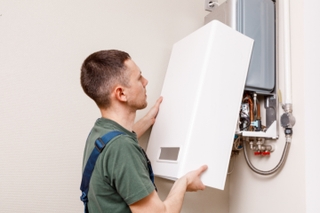A guide to boiler replacement
20 February 2020

Cold weather brings with it mugs of hot tea, snuggly jumpers and comfy, cosy afternoons at home. Keeping your home toasty and warm starts with making sure your boiler is up to scratch.
But we know that deciding whether you need a new boiler isn’t so straightforward, so we’ve put together a little guide to help.
What type of boiler do I have?
Before deciding whether you need a new boiler or not, it’s best to find out what type you currently have, and understand what other options might work for your home.
Combi boiler
A combination (or combi) boiler is the most commonly available in the UK. Its simple design takes up minimal space in your home, while it supplies hot water directly to your taps or radiators without the need for a storage tank. It also provides hot water on demand, and you only pay for what you use. The main advantages of a combi boiler are its energy-efficiency, and affordable installation process.
Conventional boiler
A conventional boiler is also known as a regular or heat only boiler. They are normally found in older homes. However, they can still be convenient for modern buildings, depending on the demand for hot water in that home. Conventional boilers heat your home through a separate water cylinder that is placed in the loft. They’re particularly useful if you live in an area with low water pressure.
System boiler
A system boiler gets water directly from the mains. It uses a large tank of stored heated water, so you can use multiple taps at the same time without a reduction in pressure. This is ideal if your home has more than one bathroom. Although it uses less space than a conventional boiler system, it's more complicated and needs more room than a combi. System boilers also need to be well insulated to make sure that the water remains heated.
Which boiler size is right for me?
The boiler size you need is decided by the number of radiators and bathrooms in your home, as well as your overall water usage. The output of a boiler is measured in kW (kilowatts) and in general, the higher the number of kW, the more powerful it will be. Most boilers tend to range between 24kW to 42kW.
Signs that you need a boiler replacement
Like with any equipment, unusual noises are never a good sign. If your existing boiler is making odd noises, this may mean that their parts are starting to wear out. If it’s ten years or older, it may be worth replacing your boiler to prevent further damage to the system. If you spot a leak, this should be investigated immediately, since it could increase levels of carbon monoxide in your home.
Should you need an emergency repair, boiler cover packages offer protection for your home.
Boiler kettling
If your existing boiler is making odd noises, this may mean that their parts are starting to wear out. A tapping sound within your pipes or unit can be a sign of sludge build-up, which can be cleaned using a power flush. However, if your unit is humming or is generally very noisy, you should let your engineer know straight away.
Low boiler pressure
If your boiler’s pressure is low, this could be a sign that there’s a loose seal on pipes and valves, or that there’s a water leak within the system due to bleeding from a radiator. If you’re experiencing pressure issues in your system, you should contact your engineer to find out whether the pressure relief valve needs to be replaced.
Boiler leaking
In normal circumstances, your boiler shouldn’t leak. If it does, components such as a seal or a valve may have been damaged. Without action, this could lead to an electrical short-circuit or structural damage to your home. So, it’s crucial to switch your boiler off and have it replaced as soon as possible. If you spot a leak, it’s important that you investigate it immediately, since it could increase levels of carbon monoxide in your home.
What’s the boiler installation process?
If you decide that it’s time to give your boiler an update, it’s useful to know what to expect during the installation of your new one. Firstly, your engineer will want to determine what kind of boiler you’ll need, so they might ask things like where your current boiler is, how many bathrooms you have and what your water pressure is like.
If it’s a simple replacement process (e.g. updating the system), it can take as little as one day. However, if your boiler needs replacing or switching out for a different type, the process will take slightly longer. Once fitted, you can expect your engineer to give you a tutorial of the new boiler controls.